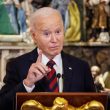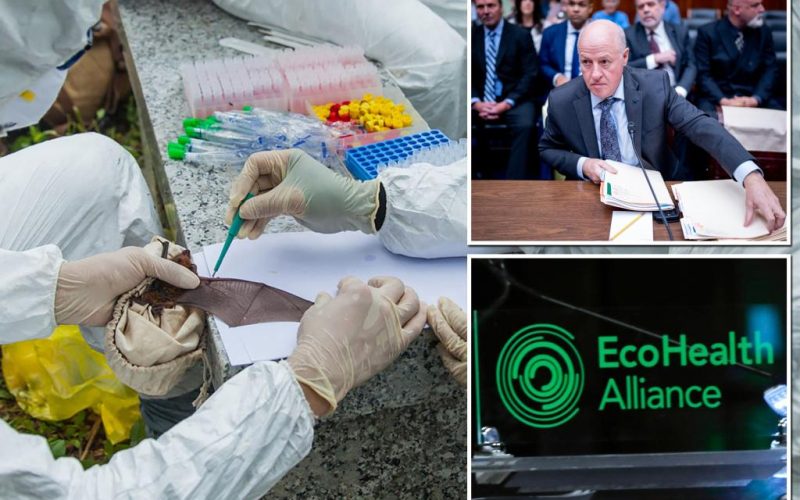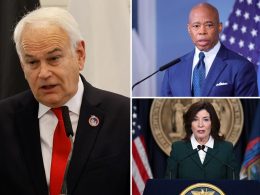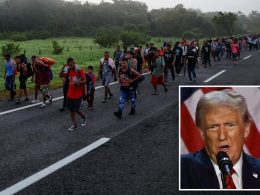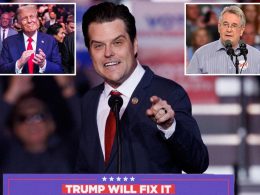The Department of Justice secretly launched a grand jury investigation into a US nonprofit that steered American taxpayer funding to the Chinese lab suspected of leaking the COVID-19 virus and causing the global pandemic, according to a bombshell report released by a House committee on Monday.
Scientific experts and former federal officials have suggested that EcoHealth Alliance’s grants to the China’s Wuhan Institute of Virology (WIV) funded gain-of-function research that could have led to a lab leak — but records requests have repeatedly been blocked by the National Institutes of Health, according to the report.
The details of the apparent federal investigation of EcoHealth Alliance remain secret — and members of the House Select Subcommittee on the Coronavirus Pandemic, which released the 520-page report on the origins of and response to the pandemic, have declined to talk about it, citing concerns about interfering in any potential DOJ investigation.
However, internal emails and records from EcoHealth Alliance included in the report reveal that the grand jury issued subpoenas for genetic sequences of EcoHealth’s research on viruses in Wuhan, as well as for correspondence between the organization’s president, Dr. Peter Daszak, and Dr. Shi Zhengli, his collaborator and the so-called “bat lady” at the Wuhan Institute of Virology who specialized on coronaviruses.
In one intercepted email, an attorney at the firm Tarter, Krinsky and Drogin tells Daszak to “skip” any reference to the federal probe when asking for more time to comply with documents request from the House Energy and Commerce Committee, which ran its own investigation on the COVID pandemic.
“I suppose we can always recite those if we get any pushback on a reasonable extension,” the lawyer writes in the Feb. 6, 2023, missive. “Especially on the Executive Branch front, where the DOJ grand jury investigation seems so far to remain nonpublic, I think it would be better just to say we’re acting as promptly as possible under the circumstances without inviting inquiry into other demands for info.”
Another slide deck apparently compiled by the law firm reads: “DoJ subpoena for genetic sequences, docs — almost complete.”
Federal prosecutors also subpoenaed for emails between EcoHealth and Zhengli — on both her Wuhan official address and personal address, other emails obtained by congressional investigators show.
Some of Daszak’s requests for viral sequences never reached their intended recipient.
EcoHealth’s counsel told the subcommittee on Nov. 1 that the email “should not be read to confirm or deny the existence of any investigation” — but 14 days later the attorney told congressional staff that the communications did not involve a DOJ investigation of Daszak or his nonprofit.”
The House COVID panel also agreed on a bipartisan basis that Daszak, who was already referred for criminal prosecution before his organization was federally debarred, “should never again receive U.S. taxpayer dollars,” a letter attached to the report by subcommittee chairman Brad Wenstrup (R-Ohio) states.
In response to questions from The Post, a spokesman for House Oversight Committee Chairman James Comer (R-Ky.) vowed that the committee will “continue pursuing records and answers that have so far been withheld from its investigations.”
Rep. Morgan Griffith, who sits on the Energy and Commerce panel, told The Post that the report “reveals the inadequacies of NIH oversight.”
“NIH failed to get the required information, progress reports and vital information as paid for by the American taxpayers,” Griffith said, while adding that it “confirms some of the ideas that I advanced in hearings and depositions with leading NIH officials and Dr. Daszak.”
The National Institutes of Health (NIH), US Agency for International Development (USAID) and other agencies awarded millions of dollars’ worth of grants to the now-suspended public health nonprofit — including a $4 million NIH project titled “Understanding the Risk of Bat Coronavirus Emergence.”
More than $1.4 million dollars flowed from NIH and USAID to the WIV for that project, which the agency’s principal deputy director Dr. Lawrence Tabak later acknowledged was gain-of-function research on bat coronaviruses modified with SARS and MERS viruses to become 10,000 times more infectious.
The resulting viruses were distinct from SARS-CoV-2 — but another EcoHealth grant proposal, for which Daszak downplayed the involvement of collaboration with Chinese researchers, has since been flagged as a possible “blueprint” for engineering the virus.
In a congressional grilling earlier this year, Daszak also admitted he had not asked Zhengli, his longtime collaborator who serves as deputy director of the WIV, for any viral sequences since before the pandemic began.
Previous findings and hearings held by the subcommittee exposed how EcoHealth specifically violated the terms of its grant agreement with NIH, leading to the suspension of its funding.
In May, the Department of Health and Human Services determined based on evidence compiled by the House COVID subcommittee that the nonprofit had been “more than two years late” with one of its reviews of a grant proposal for its Wuhan project on bat coronaviruses.
Those experiments “likely violated protocols of the NIH regarding biosafety,” HHS deputy assistant secretary for acquisitions Katrina Brisbon said, and EcoHealth had been given the opportunity to disprove that gain-of-function research was part of the grant — but had “failed to do so.”
The committee also found the restrictions issued by the government during the COVID-19 pandemic were largely “arbitrary” and caused more harm than good.
“Prolonged lockdowns caused immeasurable harm to not only the American economy, but also to the mental and physical health of Americans, with a particularly negative effect on younger citizens,” the report read.
“Rather than prioritizing the protection of the most vulnerable populations, federal and state government policies forced millions of Americans to forgo crucial elements of a healthy and financially sound life.”
On mask mandates, the subcommittee found, “there was no conclusive evidence that masks effectively protected Americans from COVID-19” — despite repeated claims by public health figures like Dr. Anthony Fauci, the former director of the National Institute of Allergy and Infectious Diseases, to the contrary.
“Public health officials flipped-flopped on the efficacy of masks without providing Americans scientific data — causing a massive uptick in public distrust,” the subcommittee report assessed, noting that Fauci and others insistence on six feet of social distancing to slow the spread of the virus “was arbitrary and not based on science.”
Fauci admitted as much in a transcribed interview and hearing earlier this year before the COVID panel.
“The COVID-19 pandemic highlighted a distrust in leadership. Trust is earned. Accountability, transparency, honesty, and integrity will regain this trust,” Wenstrup wrote in his letter to Congress on the report.
“A future pandemic requires a whole of America response managed by those without personal benefit or bias. We can always do better, and for the sake of future generations of Americans, we must. It can be done.”
Reps for EcoHealth and Tarter, Krinsky and Drogin did not immediately answer to inquiries from The Post.
The Justice Department declined to comment.

